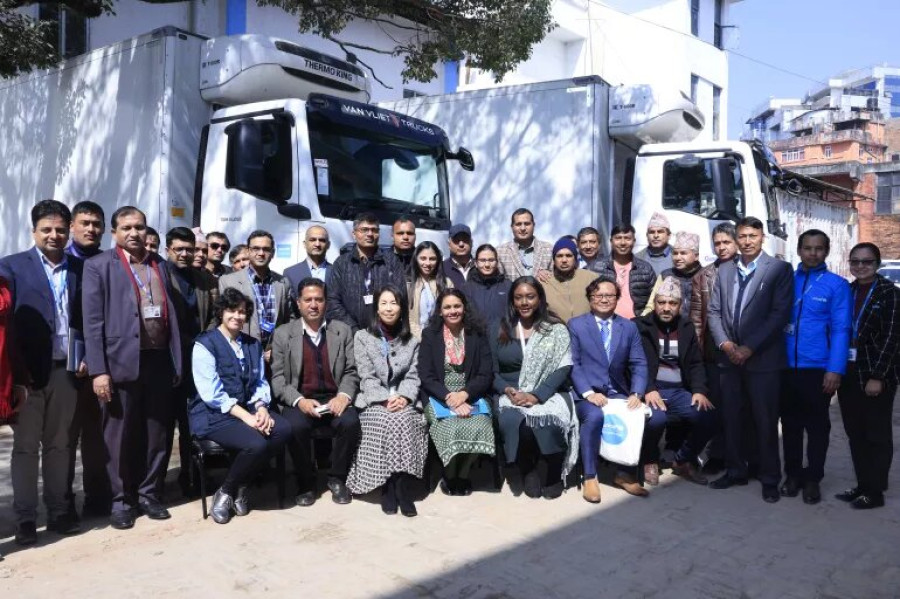National
Refrigerated trucks for vaccines handed over to the government
The trucks, which can carry four million vaccine doses each, will support the government’s efforts to strengthen its immunisation programme.
Post Report
Gavi, the global vaccine alliance, and the United Nations Children’s Fund have handed over four refrigerated trucks for vaccine transportation to Nepal’s Ministry of Health and Population.
Refrigerated trucks are a crucial part of the vaccine cold chain system, which ensures the safe supply of essential vaccines to stores at the central, provincial and district levels, officials at the health ministry said.
“I would like to express my gratitude to Gavi and UNICEF for this timely delivery of refrigerator trucks, which will help us in the upcoming measles-rubella campaign,” said Dr Sangeeta Kaushal Mishra, director general at the Department of Health Services.
Vaccine cold chain systems include proper storage facilities such as cold rooms, refrigerators, freezers in vaccine storage facilities, refrigerator containers for transportation and cold boxes, among other supportive equipment.
Officials said that the delivery of four refrigerated trucks is timely, as the health ministry is launching a nationwide measles and rubella drive next week.
Health authorities plan to make the campaign integrated and term it as ‘The Big Catch-up’, targeting children who have not yet received any vaccines, also known as ‘zero-dose’ children, and those who have not completed their doses as per the national vaccination schedule.
Around 5.7 million children from various age groups will be inoculated with the measles-rubella vaccine in a drive scheduled to start on February 25. The drive will be launched in 75 districts of the country.
The campaign has already been completed in Jajarkot and Rukum West, the two districts worst-hit by the magnitude 6.4 earthquake on November 3.
Measles is a highly contagious viral disease transmitted through fluids from an infected person’s nose, mouth or throat. It can be potentially deadly for unvaccinated people.
Nepal had committed to eliminating measles by 2023 after missing the earlier deadline of 2019. To declare measles as eliminated, the number of cases should be less than five per 1 million people throughout the year.
However, the deadly virus was reported in over 14 districts across the country at the start of 2023. At least one child died and hundreds were infected with the disease last year.
Children between nine months and 15 years from 24 high-risk districts will be inoculated with the measles-rubella vaccine in the campaign, according to officials. Likewise, the vaccine will be administered to children between nine months to five years of age from 51 districts.
During the integrated campaign, other vaccine doses such as Pentavalent, Inactivated Polio Vaccine (IPV) and Pneumococcal Conjugate Vaccine (PCV) will be administered to children who missed out on them during the COVID-19 pandemic.
“The trucks will assist the government in reaching zero-dose children, a population currently estimated at four percent according to the Nepal Demographic and Health Survey-2022,” Mishra said.
Each truck is equipped with World Health Organisation-approved refrigeration units with a 24 cubic metre storage capacity, capable of transporting nearly 4 million doses of MR vaccines. Using fewer trucks with larger capacity helps decrease carbon emissions compared to smaller, more frequent trips to all provinces of Nepal. UNICEF has allocated resources to provide these trucks, drawing from pooled funding made possible by supporters such as Gavi.
“I would like to congratulate the Nepal government for the multi-antigen catchup approach for the upcoming measles-rubella campaign, which will also ensure children who may have missed other critical routine vaccinations during the [COVID-19] pandemic stay protected,” said Temidayo Ogunrinu, Gavi’s senior country manager for Nepal.
“Today’s delivery underscores the importance of investing in infrastructure and supply chain management, with vaccine transportation a key part of ensuring life saving vaccines stay at appropriate temperatures and can be effectively delivered to communities. Gavi is committed to supporting these efforts in collaboration with our alliance partners UNICEF and WHO.”
In addition to the provision of the trucks, UNICEF, with Gavi's support, is collaborating with the government to strengthen various aspects of the national immunisation programme, including procurement of vaccines, improving the cold chain system and enhancing capacities for safe delivery of vaccines to the communities.
UNICEF, in collaboration with Gavi, has also been working with communities and local governments to identify zero-dose and under-immunised children and also the barriers experienced by these children in accessing the vaccines.




 10.12°C Kathmandu
10.12°C Kathmandu














